Midnight Express Blu-ray Movie
HomeMidnight Express Blu-ray Movie 
Sony Pictures | 1978 | 121 min | Rated R | Jul 21, 2009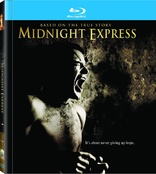
Movie rating
7.7 | / 10 |
Blu-ray rating
| Users | 4.5 | |
| Reviewer | 4.0 | |
| Overall | 4.2 |
Overview
Midnight Express (1978)
A young U.S. citizen is arrested in Turkey for smuggling hashish and then is sentenced to unreasonable time in a hellish Turkish prison, where he begins to self-destruct, until he musters the courage to plan his escape.
Starring: Brad Davis (I), Randy Quaid, Bo Hopkins, John Hurt, Irene MiracleDirector: Alan Parker (I)
| Drama | Uncertain |
| Biography | Uncertain |
| Crime | Uncertain |
| Thriller | Uncertain |
Specifications
Video
Video codec: MPEG-4 AVC
Video resolution: 1080p
Aspect ratio: 1.85:1
Original aspect ratio: 1.85:1
Audio
English: Dolby TrueHD 5.1 (48kHz, 16-bit)
English: Dolby Digital 2.0 Mono (192 kbps)
French: Dolby TrueHD 5.1 (48kHz, 16-bit)
Spanish: Dolby Digital 5.1 (640 kbps)
Portuguese: Dolby TrueHD 5.1
Subtitles
English, English SDH, French, Portuguese, Spanish
Discs
50GB Blu-ray Disc
Single disc (1 BD)
BD-Live
Playback
Region free
Review
Rating summary
| Movie | 4.5 | |
| Video | 4.0 | |
| Audio | 3.5 | |
| Extras | 4.0 | |
| Overall | 4.0 |
Midnight Express Blu-ray Movie Review
A classic Prison film arrives on Blu-ray with splendid results from Sony.
Reviewed by Martin Liebman July 8, 2009Forgive me. Please.
A powerful Drama that speaks of man's ability to endure even the most physically agonizing and
emotionally draining experiences, Midnight Express tells the true tale of Billy Hayes (Brad
Davis), an American incarcerated in a harsh, unforgiving prison in Istanbul, Turkey. One of the best
films of 1978 and the recipient of several Oscar nominations (including Best Picture) and two wins,
Midnight Express represents a level of fine filmmaking rarely seen anymore in an era of
special effects, generic scripts, and crowd-pleasing humor that more often than not denigrate
rather than elevate a script, a performance, an entire film. A film that allows its story to speak for
itself and remain the central focus of the entire two-hour experience, Midnight Express is
both supported and defined by an intensely frightening atmosphere, wonderful characterization, a
dazzlingly simple yet thoughtful and thought-provoking script, and an Oscar-winning score
courtesy of Giorgio Moroder (Scarface).
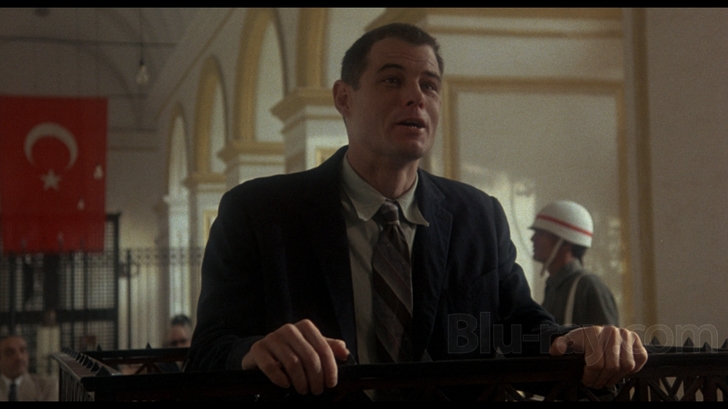
Billy Hayes pleads with the court.
American Billy Hayes (Brad Davis) fails in his attempt to smuggle hashish out of Turkey. Caught moments before boarding his plane on October 6, 1970, the illegal substance is found strapped to his body and he is held in the country while his girlfriend, Susan (Irene Miracle), returns to the United States. Billy agrees to cooperate by identifying the man who sold him the drugs, but an escape attempt hinders rather than helps his chances of leaving the country a free man. Billy is ultimately sentenced to a term of four years and two months in a cold, gray, dusty, decaying prison, his cell containing only a filthy cot and pillow. Billy almost immediately learns of the harsh realities of the prison, earning himself a severe beating for borrowing a blanket from a nearby cell. As the days go by, Billy meets several other foreigners -- Jimmy (Randy Quaid), Erich (Norbert Weisser), and Max (John Hurt) -- and learns that the only way he'll likely ever see the outside of the prison is through the "midnight express," or escape. As his release date approaches, Billy learns that he is to be made an example and his sentence is extended an additional 30 years. Desperate to escape the living hell that now defines his life, Billy must find a way to ride the express before prison life kills him, one way or the other.
Defined by a collection of core storytelling principles that serve only to enhance the story rather than rework it into something easier, more palatable, more "audience friendly," Midnight Express never backs off from its agonizing excursion deep into the human psyche as Billy falls deeper into a state of physical and emotional decay. As the prison walls figuratively close in around him, Billy's mind seems to practically shrink as a result of the despair wrought by experiences too difficult to bear. His sentence unjustly extended and his friends suffering terrible fates, Billy sinks into a state of anguish marked by a loss of self-control, hope, and sanity. Brad Davis' performance recalls some of the better efforts through the history of film. The actor covers a broad spectrum of emotion, captures the hardships of the physical and mental degradation brought on by the realities of prison life and the loss of many basic freedoms and comforts, and immerses himself in the role and the poignancy of the story. An impassioned performance as evidenced at several key junctures throughout, not the least of which is a moving, blunt, and hard-hitting plea with a Turkish judge before being re-sentenced to an additional 30 years in prison, Davis delivers an all-around superb effort that may not be remembered as one of cinema's all-time classic performances but is certainly one that is terrific in every regard.
A no-frills story told passionately, coherently, and with basic but highly effective technical know-how, Midnight Express succeeds as a work of art because of its ability to lure audiences into its world not through pandering clichés but instead through a wonderful simplicity that defines the story, its characters, and the cinematic techniques employed to bring them to life. Alan Parker's direction in Midnight Express creates an atmosphere characterized by tension, danger, and mystery as the overtones that define the film's basic structure, but never allowing those superficialities to overburden or otherwise mask the emotional undercurrent that truly makes the picture. Midnight Express is a cerebral tale rather than a visual one, the camera working not to tell the story but merely capture it, allowing audiences to feel a member of the prison population and experience the array of physical and emotional distress almost firsthand. Also brilliantly but not all intrusively adding to the experience -- both on the surface and also embracing the undercurrents that run in conjunction with the film -- is Giorgio Moroder's period-influenced but nevertheless timeless score that always seems to tell the story to the same degree of effectiveness as the direction, writing, or acting.
Despite its many artistic merits, Midnight Express has become one of the more controversial films in Hollywood history for its over-dramatization of the true circumstances behind Billy's prison stay in Turkey. Oliver Stone's (JFK) screenplay has garnered plenty of condemnation for its broad strokes that differentiate good and evil strictly through clearly-defined lines, but it also earned the oft-criticized Director an Oscar win for its riveting, bold, natural, and superficially simple yet emotionally complex approach to the material. Director Alan Parker addresses the issue of "truth" versus "fiction" in his memoir Anatomy of a Film: The Making of Midnight Express (included as the printed text accompanying the Blu-ray release of the film): "Certainly it was based on a true story. But that didn't mean that it was a true story." Parker continues with a discussion on the fallibility of memory and probability that dramatic license was taken in Hayes' own autobiographical account, penned with the help of ghostwriter William Hoffer. Speaking on Stone's contributions to the project, its historical accuracy, and further dramatization for moviegoing audiences: "Oliver Stone wrote his screenplay and undoubtedly moved further away from the original 'truth,' adding his own unique slant to the proceedings." Midnight Express was, is, and will continue to be, an oft-analyzed film for both its artistry and its many controversial under- and overtones, including the painting of a drug smuggler as a sympathetic character. On artistic merit alone, however, Midnight Express remains one of the finer films of the past several decades, a testament to superb moviemaking in its purest form and a powerful story on the human condition.
Midnight Express Blu-ray Movie, Video Quality 
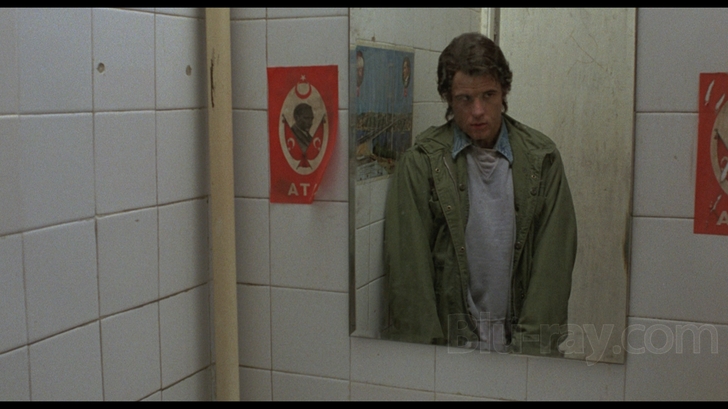
Midnight Express arrives on Blu-ray with a 1080p, 1.85:1-framed transfer. The Blu-ray delivers a solid picture quality that never jumps off the screen with crystal-clear images and vibrant colors, but it is representative of and faithful to its source. A few artifacts are visible here and there, but such anomalies are the exception to the rule. The print is generally blemish-free, and it contains a moderately high amount of film grain that offers to the picture a film-like appearance. Midnight Express is a drab, lifeless movie, reflective of the setting and tone of the drama. Colors are drab and dim, details can appear a bit hazy, and neither sharpness nor depth are all that spectacular. Fine details are often adequately reproduced, primarily in the form of grimy prison walls and rusted iron bars. Flesh tones look fine in context, but blacks occasionally drown out detail or, at other times, look too bright, for instance a sequence in chapter 11. While Midnight Express doesn't look like The International, it does look as intended and this Blu-ray edition offers a fine transfer in context.
Midnight Express Blu-ray Movie, Audio Quality 
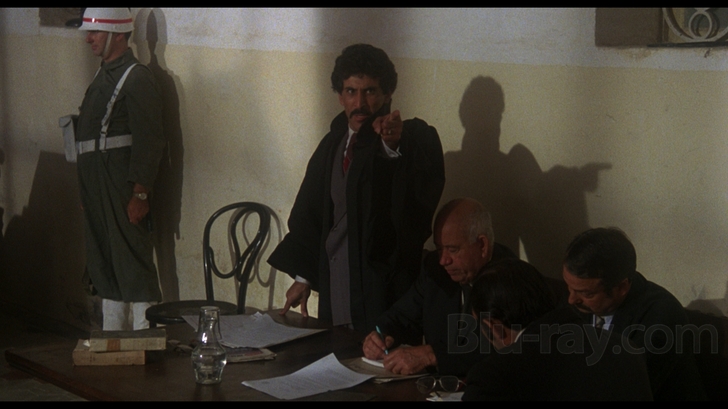
This Blu-ray release of Midnight Express features both lossless Dolby TrueHD 5.1 and lossy Dolby Digital mono soundtracks. The Lossless track improves upon the mono offering by delivering increased clarity and resolution, but the additional channels don't necessarily mean an abundance of extra sonic activity. The lossless track remains centered straight up the middle with little information sent to the adjoining speakers. Ambient sound effects, for example the hustle and bustle of the Turkish airport at the beginning of the film, features all of the environmental effects up front and playing mostly through the center speaker. Music often plays with little in the way of volume at reference levels, a chase scene in chapter 3 playing as a rather cut-and-dry experience that delivers the sound but doesn't do all that much with it. Dialogue is reproduced efficiently throughout. Like the picture quality, Midnight Express' lossless soundtrack impresses in context. It doesn't create a phony atmosphere or otherwise add to the original track. It's mostly a clearer, more precise rendition of the mono track, just the way it should be.
Midnight Express Blu-ray Movie, Special Features and Extras 
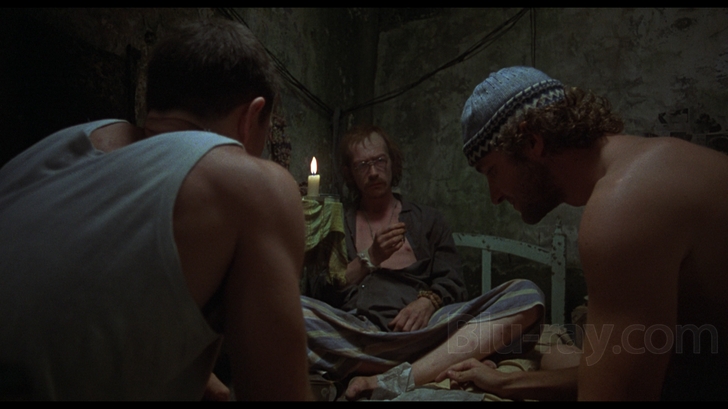
Midnight Express rolls onto Blu-ray with a fine selection of bonus materials, headlined by
a
commentary track with Director Alan Parker. A solid track that's delivered rather dryly, Parker
speaks on the expected range of topics, including the origins of the project and his involvement,
the
Academy-Award winning score (the first electronic score to win the Oscar), shooting techniques
and
locations, the film's themes and the importance of story rather than specific location, the actors,
changes in the script and how the ending differs from the true story, addressing some of
the
criticism laid on the film, and plenty more. Parker delivers a fine commentary track that's worthy
of
the quality of the film. The Producers (1080i, 25:54) features Producers Peter Guber,
David Puttnam, and Alan Marshall speaking on a broad range of topics about how the film came
together, including their initial involvement with the idea and script, the assemblage of the cast
and crew, the process of screening the completed film and a particularly humorous gaffe, the
film's legacy, and more.
The Production (1080i, 24:28) features more interviews, this time with Director Alan
Parker; Producers David Puttnam, Peter Guber, and Alan Marshall; Billy Hayes; Writer Oliver
Stone; and Actor John Hurt. They discuss Stone's screenplay; the cast, their performances, and
signing an untested actor into the leading role; the shooting locations; the work of the entire
crew; and the challenges of the shoot and the story. The Finished Film (1080i, 23:48)
once again features Director Parker, Actor Hurt, Producers Marshall and Guber, and Writer Stone.
In this piece, they further discuss the acting, the look of the film, the soundtrack and score, the
editing process, the film's themes, regrets, and the controversies that surround the film. The
Making of 'Midnight Express' (480p, 7:27) is a vintage piece that looks briefly at the story,
the politics surrounding it, and contains plenty of clips from the film and interviews with Billy
Hayes, Williams Hayes, Sr.,
Producer Guber.
This disc also includes a photo gallery (1080i, 12:40), 1080p trailers for The Da Vinci Code,
A River Runs Through
It, Casino Royale, Damages: Season
One, Obsessed, and Not Easily Broken,
and BD-Live (Blu-ray profile 2.0) functionality. The digibook contains the
aforementioned essay, Anatomy of
a Film: The Making of Midnight Express, with full color photographs.
Midnight Express Blu-ray Movie, Overall Score and Recommendation 
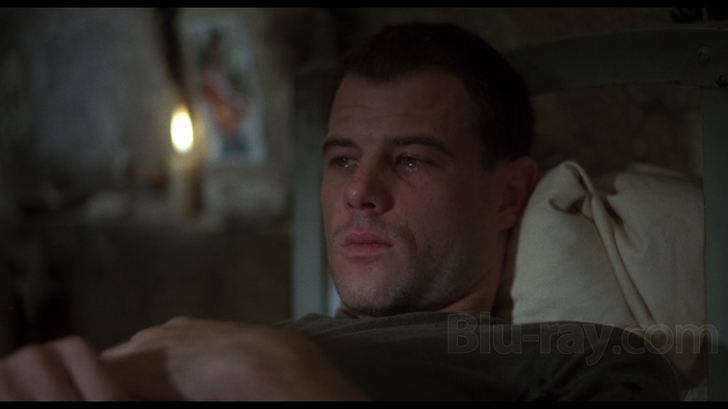
Superbly crafted and emotionally involving, Midnight Express often defeats the moral quagmire as presented in the film and the controversial aspects of its script through sheer moviemaking brilliance. Managing to turn a drug-smuggling character into a sympathetic figure due to his disdainful treatment in a hellish foreign prison and taking liberties with a true story for dramatic and artistic license (a common practice among historically-based motion pictures though perhaps not with such a gritty look, feel, and effect as portrayed here), Midnight Express certainly deserves the accolades bestowed upon it by the Academy, though the subject matter and controversial depiction thereof makes it a rather unique film in the annals of cinema. No matter one's take on this representation of Billy Hayes' story, there is no denying the artistic merits Midnight Express brings to the table, its superb technical achievements reason alone to watch. Sony's Blu-ray release of Midnight Express befits the film. Delivering a true-to-the-source 1080p transfer, a lossless soundtrack that improves upon, but doesn't redefine, the original mix, and plenty of bonus materials, this "digibook" release comes highly recommended.
Similar titles
Similar titles you might also like

Papillon
1973

Capone
2020

Hunger
2008

Papillon
2017

Cool Hand Luke 4K
1967

Escape from Alcatraz 4K
1979

Mesrine: Killer Instinct
Part 1 / Mesrine: l'instinct de mort
2008

Animal Factory
Special Edition
2000

Mesrine: Public Enemy No. 1
Part 2 / Mesrine: L'ennemi public n°1
2008

Brute Force
1947

Carlito's Way 4K
1993

American History X
1998

Interrogation
Przesłuchanie / Slipcover in Original Pressing
1989

Rendition
2007

The Getaway
1972

Lady Vengeance
Sympathy for Lady Vengeance | Ultimate Revenge Edition | 친절한 금자씨
2005

Sleepers
1996

Wall Street: Money Never Sleeps
2010

Black Mama, White Mama
1973

Only God Forgives
2013